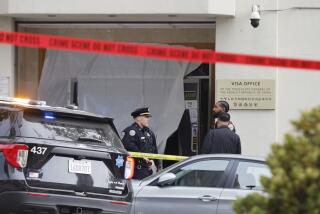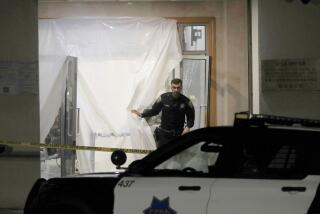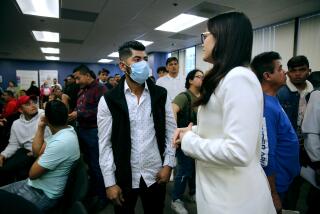Revolution Sweeps Aside Soviet Consulate in S.F. : Diplomatic corps: Russian flag now flies. Delegation wonders what’s next for them--and their country.
SAN FRANCISCO — The dried-up drippings of an egg, expertly tossed in an angry protest years ago, still cling to a shuttered window of what was the Soviet Consulate.
Antennas still sit atop the roof, as they did when the FBI assumed that the KGB was trying to snatch Silicon Valley secrets from the airwaves. A chirpy recorded voice continues to welcome callers to the Soviet Consulate, and the telephone menu explains how you apply for Soviet citizenship, for a $252 processing fee. A painting of a benign-looking Vladimir Ilyich Lenin hangs in an entryway.
In the first days of the new Russian Federation and Commonwealth of Independent States, no one in the delegation of about 25 had found time to remove all trappings of the old Soviet Union from the brick edifice that houses the consulate of the new nation.
But in this westernmost outpost of the new Russian order, a revolution has taken place. What was for almost 20 years Soviet territory at the toniest end of Green Street is now the domain of Russia. Even some FBI agents who spent years keeping track of the Soviet diplomatic corps are looking to bail out of the foreign counterintelligence squad to something with more action: drug or white-collar crime units.
“The whole game has changed,” one veteran agent said.
The revolution on Green Street was quiet, almost anticlimactic. The final blow came in a Christmas Day wire from Moscow announcing that the Russian Federation had assumed control of the Foreign Ministry.
Andrei E. Rogov, the consulate’s press attache, said that “the next logical step” was to unfurl the white, blue and red Russian flag and hoist it up the flagpole. The old hammer and sickle was placed in storage--”for posterity,” Rogov said.
The new flag was ready and waiting. “I’ll let you in on a little secret,” Rogov said. “We had them on hand.” A delegation from Moscow had brought a supply of the tricolor flag, the same design that flew over Ft. Ross in 1841 before the last Russians left their California outpost.
The changes here may not be as dramatic as they were in Moscow, but they come with a measure of pain nonetheless. Sitting comfortably in San Francisco, where every foodstuff and consumer good imaginable is available, the Russian delegation watches news reports of people back home struggling with skyrocketing prices. And for all the relative stability of their Pacific Heights post, they know that nothing is certain in their homeland.
“Your emotions tend to run out. There is only so much sensational news you can take,” said Rogov, 27.
He was in Moscow last August, waiting to leave for his new assignment in San Francisco when the failed military coup occurred. The fact that he granted an interview on a few minutes’ notice is another sign of the changing times.
Across town at the Tass news bureau, correspondent Andrey Sidorin is putting the finishing touches on a piece about the Golden Gate Bridge. It will be his swan song. His four-year stint here is at an end, his replacement arrives today, and by month’s end, Sidorin will be back in Moscow, and its problems will become his problems.
In his bags, he will carry a supply of spaghetti. His 5-year-old son has developed a taste for it and he doubts that it will be available.
“I’m preparing for hard times,” he said.
On his return, he figures that he will make a tenth of the $1,000 a month he now takes home. He will be living in a small one-bedroom apartment, a far cry from his spacious apartment in the upscale Marina district.
He hopes to remain in journalism. Given his fluent English, and his years spent working in San Francisco, New York and London, he expects that he will remain employed.
But his employer’s future, like his country’s, is uncertain. Tass was a branch of the Soviet government. For now, it is under the Russian government’s wing. What will come of it is “a good question,” Sidorin said.
On the day that Russian President Boris N. Yeltsin lifted price controls and the cost of food shot upward, Sidorin flipped on the network news and gave an uneasy laugh as the anchorman intoned that the only good news in Moscow is that things cannot get much worse. Sidorin doubts that the economy in his homeland will improve soon.
“It will last,” he said of the economic hard times. “It will take not one year, or two years. It will take 10 or 15 years.”
At the consulate, Rogov said, the staff has been told that decisions on the mission’s future will be made within the month. As of now, the Russian Federation pays the bills, but consular officers handle business for all 11 republics of the commonwealth.
Last year, the consulate issued 52,000 visas, he said. He expects that visas will remain in demand and that American entrepreneurs will continue to invest in the commonwealth. The pitch is simple: A stable Soviet economy is in the world’s best interest, he said.
“If it crumbles, God forbid, and returns to an authoritarian rule, that would not be good for anyone,” Rogov said.
The Soviet Consulate opened in San Francisco in 1972, the same year the Soviets granted the United States permission to open a consulate in Leningrad, now called St. Petersburg. It is one of three missions in this country; the others are in New York and Washington.
From the day the doors opened, FBI agents kept close watch, assuming that as many as a third of the delegates were intelligence officers. The more athletic agents occasionally chose as their vantage point a basketball hoop a block away, and played casual games while keeping an eye on the place. Some neighbors considered the consulate a nuisance, and complained that the bristling thicket of antennas blocked their bay view.
But the events in Moscow are bringing changes in the way the consulate is viewed. Lately, there has been talk of easing travel restrictions on the delegation. Now, members of the delegation cannot venture beyond a 25-mile radius of San Francisco without approval.
The State Police still guard the consulate, a leftover from the 1980s when protests outside the consulate were nearly a daily event. The last rally was in August, when a few die-hard Communists showed up to rail against the end of communism in Russia, a neighbor said.
That last hurrah was a far cry from the protests of old. In 1983, hundreds turned out to harangue the Soviets over the downing of Korean Air Lines Flight 007. It was at that protest that John Hummer, a retired professional basketball player who lives a few doors away, tossed the egg, the remnants of which hang on the the window to this day.
If the shades were not perpetually drawn, anyone looking out the window could gaze at the Golden Gate Bridge, Alcatraz and the hills of Marin County. But even the egg may soon go the way of the Soviet Union. A work crew is busily painting the building and replacing all the old windows.
More to Read
Sign up for Essential California
The most important California stories and recommendations in your inbox every morning.
You may occasionally receive promotional content from the Los Angeles Times.










